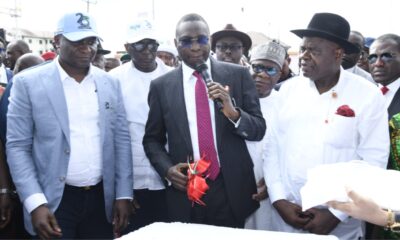Business
EU To Spend £ 2.87mTo Stop Gas Flaring In Rivers, Bayelsa
The European Union (EU) has made public the availability of about 2.87 million Euros to be invested in a project to reduce gas flaring in the Niger Delta region, particularly in Rivers and Bayelsa states, over a period of 39 months.
This was disclosed in a pre-feasibility study for the EU-Nigeria Dialogue on Energy, released on Thursday, during a workshop in Abuja, by the Delegation of European Communities to Nigeria.
According to the document, the Nigerian energy sector has been in crisis for many years, adding that “The objective is to catalyse the development of natural gas and renewable energy markets and sustainable community-based energy facilities within and beyond target communities and target states, through policy reform and by demonstrating that alternative community-based energy facilities can provide sufficient power for meeting rural and urban community needs.”
According to the EU, Nigeria could be said to be in a series of downward spirals “In terms of energy issues”.
“Areas of concern include oil (refining, fuel subsidies, bunkering); gas (flaring, the implementation of the Gas Master Plan); electricity (6000MW, widespread use of generators); coal (little coal mining, partial privatisation, large numbers of redundancies); uncompleted reforms and employee concerns and poor quality of power sector data.”
The EU noted other challenges in the industry to include corruption, weak nuclear aspirations, renewable energy, environmental challenges, poor transmission and distribution infrastructure, erratic pricing policy for electricity and petrol, lack of maintenance and open door policy, as well as tensions between private and public participants and state and federal governments.
The EU has also recommended the establishment of a Niger Delta Development Trust Fund/Bank to help with the reconstruction and development of the area, in the aftermath of the amnesty by the federal government.
It recommended as part of on-going efforts to develop the region, and ultimately the nation’s energy sector, the creation of Niger Delta Development Trust Bank Fund or bank in the mould of the European Bank for Reconstruction and Development.
It said, “We believe that the problems facing the energy sector in Nigeria are systemic, meaning that solutions have to cover the whole system and not isolated parts of it. Systemic failure needs systemic solutions.
“Key areas of recommendation to revamp the sector including support to domestic gas development, integrated package of local content and capacity building, development of clusters, and a Niger Delta Development Trust Fund or bank as with the successful example of the European Bank for Reconstruction and Development.”
These new energy sources, he said, could contribute to a Nigerian economy that is based on energy efficiency as well as contribute to lifting millions out of poverty.
“Think of the boost the realisation of the government’s plan on power generation and distribution could have on private sector, particularly on small and medium enterprises, on job creation, poverty reduction and achievement of the MDGs,” he said.
Business
NPA Assures On Staff Welfare
Business
ANLCA Chieftain Emerges FELCBA’s VP
Business
NSC, Police Boost Partnership On Port Enforcement
-
Sports5 days ago
Spanish Football Fires Entire Refereeing Committee
-

 Features5 days ago
Features5 days agoBetween EFCC And NDDC: Strategic Alliance For Niger Delta
-

 News5 days ago
News5 days agoCourt Sentences Gospel Singer To Death For Killing Girlfriend In Nasarawa
-

 Politics5 days ago
Politics5 days agoMakinde Renames Polytechnic After Late Ex-Gov
-
Sports5 days ago
Olympic Day Sparks Nationwide Fitness Fever
-

 Nation5 days ago
Nation5 days agoOgoni Stakeholders Hail Zabbey’s Performance
-
Sports5 days ago
I Joined Saudi League To Win Titles – Senegal Keeper
-

 Niger Delta5 days ago
Niger Delta5 days agoOBALGA Sole Administrator Presents Brand New Fire Extinguishers To Council …Commiserates With Traders Over Rumuomasi Market Fire Incident …Commences Desilting Of Drainages

